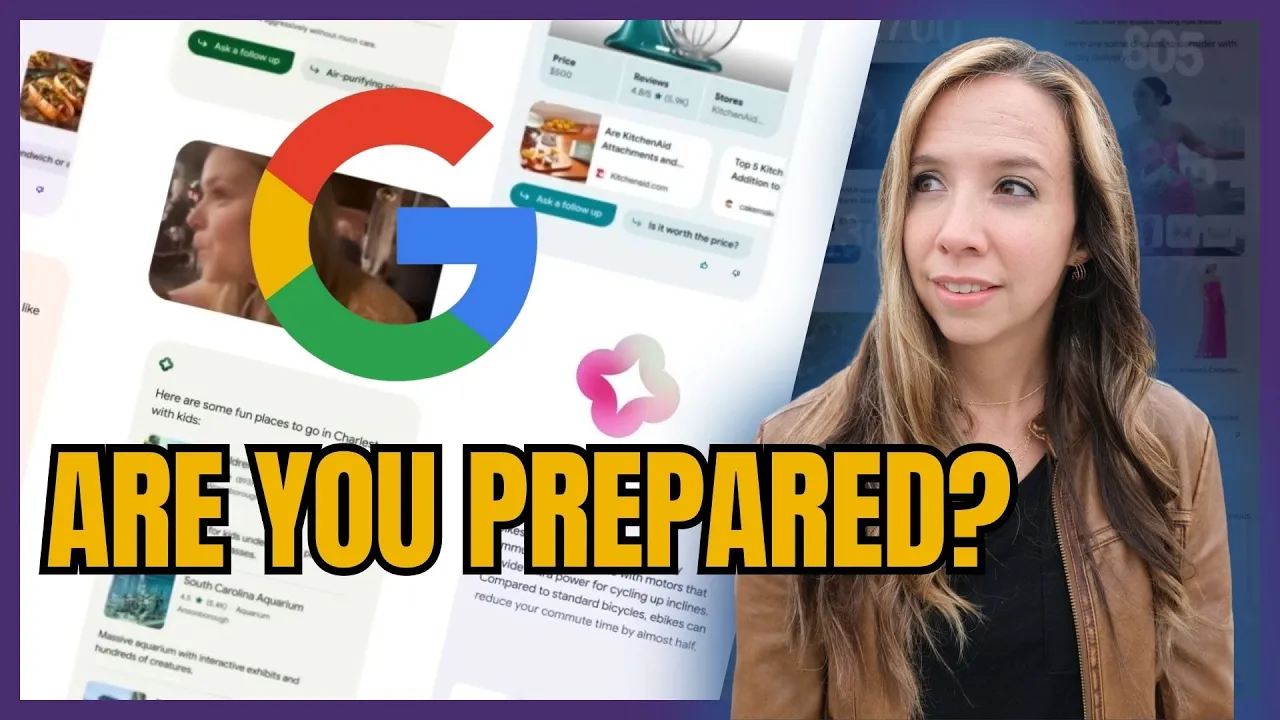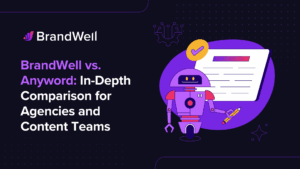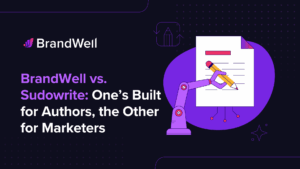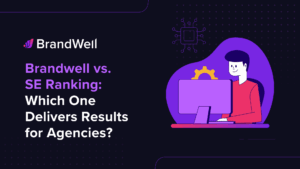Picture this.
You’re a master of SEO strategies.
But now, generative search AI enters the game.
It’s changing the landscape of search engines and content creation like never before.
You wonder if your skills are still relevant in this new world of AI-generated content and advanced algorithms.
Fear not!
In this blog post + video (a free masterclass!), we’ll break down:
- What you need to know about Google Search Generative Experience.
- What Google will actually be doing in terms of attribution and giving credit to creators.
- How to pivot and get ahead with your content strategy.
You’ll also get an inside look at my content strategy for BrandWell, which took us from 160 to 15,000 indexed keywords in Google in just a few months — and apply it to your own agency. 💥
There’s no stopping generative AI. It’s here and it’s here to stay. I believe this is the single most important topic that relates to your SEO content marketing today.
Learn how to adapt, how to satisfy E-E-A-T in a post-generative AI world, and why Google’s I/O might actually HELP, not HURT, creators like you.
Let’s get to it.
Google’s Generative AI SERP: What’s Coming and How Publishers Can Adapt
Google is currently losing out to ChatGPT – there’s no question.
On February 8, 2023, its parent company Alphabet lost $100 billion in market value when Bard produced factual errors during its first demo.
No wonder they’re speeding up the launch of their generative AI, called Search Generative Experience (SGE), which debuted last May 10 at Google’s I/O Keynote.
AI is set to touch every single app and interface we use in Google. It even announced its plan to roll out AI copywriting directly inside the ad manager in July 🤯. That’s wild!
After watching Google’s I/O developers conference around 30 times and listening to experts talking, I’m going to share with you some real insights — not hearsay — on Google’s generative search AI.
Why is this such a big deal?
Because Google brings in 80% of the world’s online traffic.
There are 8.5 billion searches on Google each day.
That’s a TON of traffic.
.png)
Here at BrandWell, the content strategy I’m building brought 396,000 new users to our website in April — all organic traffic sourced from Google.
.png)
And as you can see from this Semrush data, we now have over 15,000 keywords indexed in Google — 258 in the top three!
.png) This is why we care about how AI is going to affect the SERPs.
This is why we care about how AI is going to affect the SERPs.
How Will Generative AI Impact Search Traffic?
First, let’s go back to December 2022 when Google started carefully planning this all out.
That month, Google released its E-E-A-T guidelines.
What does E-E-A-T stand for?
Experience. Expertise. Authoritativeness. Trustworthiness.
.png)
These are considerations that go into the page quality (PQ) rating of a website.
By using E-E-A-T, Google determines whether a web page is accurate, honest, safe, and reliable — or not.
Is this page trustworthy? Can we show this page in search results without harming our users?
For Google, trust is the most critical component of E-E-A-T because “untrustworthy pages have low E-E-A-T no matter how experienced, expert, or authoritative they may seem.”
Let’s break down these first three letters.
Experience
What does Google say about Experience?
“Consider the extent to which the content creator has the necessary first-hand or life experience for the topic. Many types of pages are trustworthy and achieve their purpose well when created by people with a wealth of personal experience. For example, which would you trust: a product review from someone who has personally used the product or a “review” by someone who has not?”
This goes to show that pages that are created by people with a wealth of personal experience on the topic are the ones that rank well in Google.
But what about Expertise?
Expertise
“If the E-E-A-T of a page is low enough, people cannot or should not use the main content of that page. If a page about “Your Money or Your Life” (YMYL) topics is highly inexpert, it should be considered untrustworthy and rated lowest.”
YMYL refers to content that can have a significant impact on an individual’s life or finances. Such content is treated with high regard and therefore must meet higher quality standards. Examples of YMYL topics are medical, financial, and legal information.
Finally, let’s look at Authoritativeness.
Authoritativeness
When ranking a page, Google takes into consideration the reputation of the website and content creator. This means your reputation as a publisher outside of your website.
- What are other websites, forums, and guest blogs saying about you?
- What does your author byline look like on those sites?
- Which web pages are linking to your web pages?
- What is your reputation on the Internet? Are you showing up on podcasts or live events? Are you attributed in these places as an expert?
With the arrival of AI, specifically ChatGPT, people seem to think they can launch an entire website and generate content with the simple click of a button — and immediately rank in Google. 😂
But with Google jumping ahead and emphasizing E-E-A-T guidelines, the expertise and reputation of an author or publisher now matter MORE THAN THEY EVER DID.
Low E-E-A-T vs High E-E-A-T
Pages that lack an appropriate level of E-E-A-T for the topic or purpose of the page are considered low-quality and are sent to the bottom of the heap.
Here are some actual examples of low E-E-A-T from Google:
- The content creator lacks adequate experience, e.g. a restaurant review written by someone who has never eaten at that restaurant
- The content creator lacks adequate expertise, e.g. an article about how to skydive written by someone with little to no expertise in skydiving
- The website or content creator is not an authoritative or trustworthy source for the topic of the page, e.g. tax form downloads on a cooking website
- The page or website is not trustworthy for its purpose, e.g. a shopping page with minimal customer service information
So what is high E-E-A-T then?
“Pages with high E-E-A-T are trustworthy or very trustworthy. Experience is valuable for almost any topic. Social media posts and forum discussions are often high quality when they involve people sharing their experiences. From writing symphonies to reviewing home appliances, the first-hand experience can make a social media post or discussion page high quality.”
Interesting that Google specifically mentions social media and discussion forums as high-quality E-E-A-T. This means that how you’re talking about your experiences on social media could impact the ranking of your website. It’s the perfect platform to show off your expertise.
What makes up the highest E-E-A-T?
“Very high E-E-A-T is a distinguishing factor for highest quality pages. A website or content creator who is the uniquely authoritative, go-to source for a topic has very high E-E-A-T. A content creator with a wealth of experience may be considered to have very high E-E-A-T for topics where experience is the primary factor in trust. A very high level of expertise can justify a very high E-E-A-T assessment. Very high E-E-A-T websites and content creators are the most trusted sources on the Internet for a particular topic.”
.png)
How Do You Win with E-E-A-T in the World of Generative Search AI?
“People will always value the input of other people” — that’s what Google said last May during the I/O developers conference.
It did not say people will value the input of robots. The content creator is still front and center even as Google brings generative AI to Search.
“We know that people want to hear insights from others to help inform their decisions, so we’ve designed these new experiences to highlight and drive attention to content on the web, making it easy for people to dive deeper into the topic they’re learning about. As we bring generative AI to Search, we’re committed to continuously sending valuable traffic to sites across the web.”
Say that last line out loud: Google is committed to driving traffic to YOUR website.
This is where the “E” in E-E-A-T comes in.
Google will be sending traffic to trustworthy content creators so we need to let our personal experience shine to earn that traffic.
Google’s Generative Search AI: How SGE Works
SGE stands for Search Generative Experience.
According to Google:
“SGE will show an AI-powered snapshot to help people quickly get an overview, with factors to consider and a helpful synthesis of relevant insights and information. These snapshots serve as a jumping-off point from which people can explore a wide range of content and perspectives on the web.
SGE will show links to resources that corroborate the information in the snapshot, so people can check the information themselves and explore further. This allows people to dig deeper and discover a diverse range of content from publishers, creators, retailers, and businesses and use the information they find to advance their tasks.”
.png)
After digging into the I/O keynote and listening to almost every expert talk on this topic, the one entity that comes out as the winner is the content creator. Hands-down.
The changes that will come to generative AI in search will attribute creators and publishers focusing on providing value through E-E-A-T.
These are ALL-NEW placements that were never possible till now. See this screenshot from the I/O keynote preview of generative AI, how brands will be featured and attributed for long-tail keyword searches in the upcoming SGE:
.png)
Over and over, I saw niche sites earning those placements when Google revealed its examples of how generative search AI will work. This is great news!
These featured placements are clearly attributed to the actual source, with the name of the website and the favicon representing that brand. It’s like a brand placement right on the SERP instead of just a link!
.png)
The new search with generative AI is going to attribute the creator and this attribution is worth a lot of gold. This could be a better placement than a featured snippet or the organic blue link for non-sponsored pages. It’s a prime spot that we can now earn as Google rewards publishers that are building true experiences.
.png)
Personally, I think SGE is pretty cool. I don’t believe it’s detrimental to search. If anything, it will weed out all the non-experts, get rid of a ton of crappy content, and clean up the SERPs.
Here’s why I don’t think AI Search will make clicks obsolete:
Google has way too much money to lose. Their revenue in 2022 amounted to $224.47 billion, and $162.45 billion came from ads.
There would be no ad competition if they didn’t have publishers like you and me. We create the content on the internet. Organic traffic/content is what pushes the ad content forward. It increases the cost per click, and with more competition comes more ad revenue.
.png)
E-E-A-T Your Way to Golden Attribution
With the creator attribution added to Search, the double E in E-E-A-T has now become more important than ever when it comes to ranking. I think this was Google’s way to predict and filter all the AI-generated garbage that was coming this year.
Remember: Your personal experience is HOW you stand out and earn that double E in E-E-A-T.
If you’re going to talk about skydiving, then go and skydive, get a picture, and talk about your experience. That will add so much weight to your topic.
This comes down to two things (surprise, surprise):
- Content around your area of expertise (quality BrandWell).
- Links (citing you on high-quality sources as a known expert).
If you’re selling content as a service for clients, it’s their area of expertise you need to be writing about. That will be the core of your keyword research and topic research.
Are you building enough links? Are you quoted on high-quality sources as a known expert? What does your author byline look like on guest blogs?
At BrandWell, we went from around 160 indexed keywords in Google to over 15,000 in a few months, and now we have a whole strategy and a whole team executing E-E-A-T content.
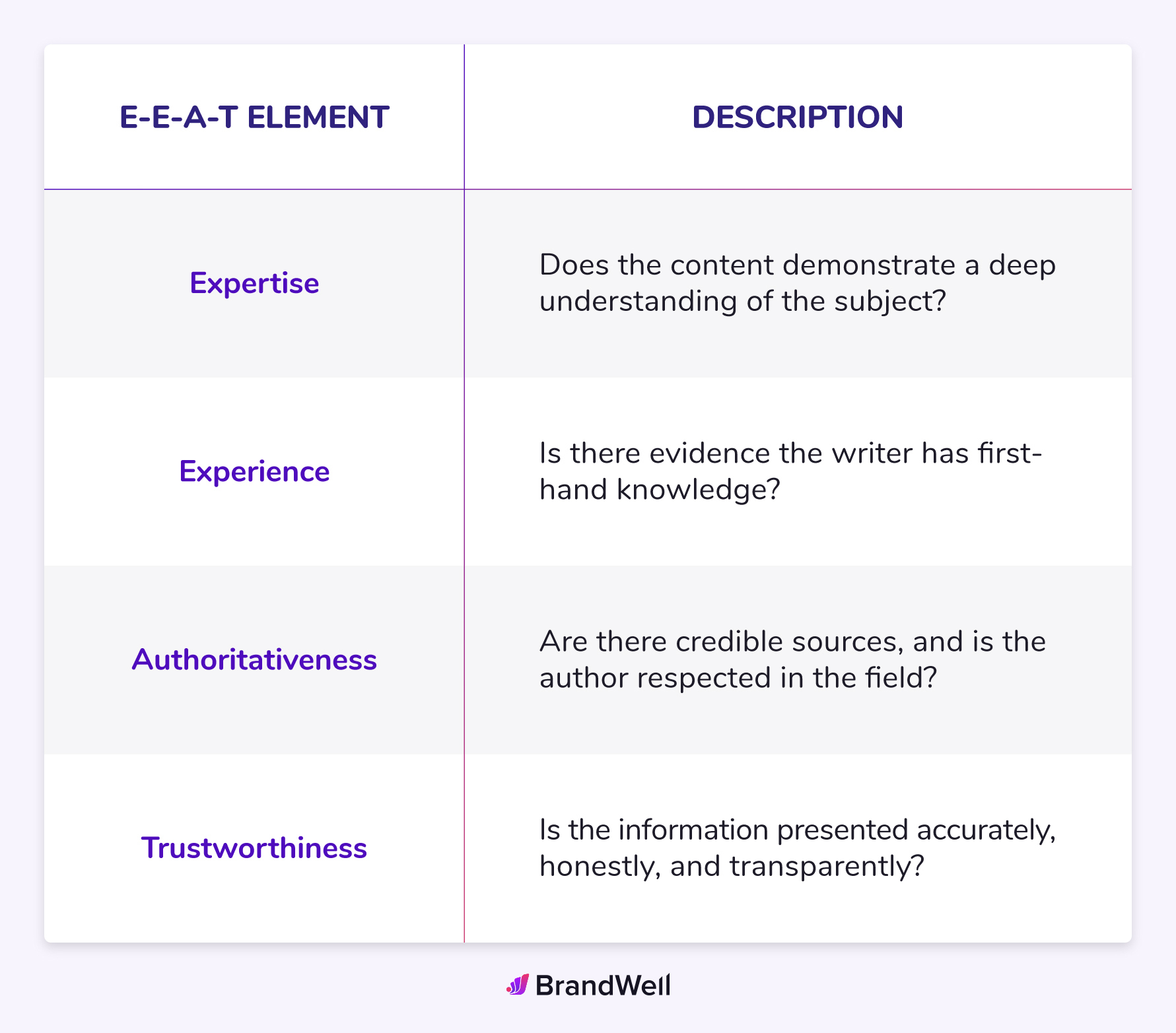
How to Future-Proof Ourselves and Earn Generative Search AI Rankings
With generative AI, content creators will actually get a lot of business from this shift — as long as they build experience and expertise.
With experience now a huge ranking factor, there’s some real estate that you can grab directly from big players that might come crashing down.
First, we’re creating content with AI and fully embracing it to save time and energy. With tools like BrandWell, it would be foolish not to use them and save considerable amounts of time, effort, and money.
Here’s why we’re not worried about using AI to develop our website content:
Google says it will reward high-quality content however it’s produced. They even said AI-generated content fits into their approach to showing helpful content to people.
What Google doesn’t like is spam or creators putting low-quality content out there.
.png)
My strategy for BrandWell, as well as my other brands like Content Hacker, is to double down on killer top-of-funnel (TOFU) content. That’s your content on the awareness stage — your long-tail keywords.
A lot of companies are running the other way. They’re cutting their TOFU budget.
But what we see is opportunity. Because of Attribution in generative search AI and its focus on Experience.
Goodbye, fake experts. They should have been kicked from the internet a decade ago.
What we’re doing at BrandWell is loading our TOFU content with value through:
- Long-form writing that proves expertise and knowledge (AI-generated, human-optimized).
- Video content supporting the topic of the written content and displaying experience.
- Capturing that traffic with interactive elements to increase activity and conversion (a free tool, quizzes, lead magnets, etc.)
BrandWell has a long-form content writer that creates your SEO content in minutes. That baseline draft is really good, undetectable, and original but we never let them go live without a human touch at the end.
We’re also doing a lot of video content to support the topic of our written content.
We’ve developed a free tool — our proprietary AI detector — that enables people to achieve a purpose at no charge at all. This tool is the perfect example of building expertise and experience.
Just look at the results below.
.png)
Our AI detector page is now ranking for almost 800 keywords!
Here’s what’s on our landing page.
.png)
First, we have a YouTube video of me talking about my experience in content marketing — 100% related to the topic — and why you need to use an AI content detector. With my decade of experience, I know why this matters. I am an expert on this.
And then we have the how-to written content which was actually generated by the BrandWell app but humanly optimized by me.
Because the AI detector technology is new, the FAQs generated by the AI were not very good and needed some editing. But it saved me another hour of researching new FAQs. Instead, the AI pulled a new set of FAQs and all I did was edit them.
With this 1,200-word landing page with a free tool ranking for 800 keywords, my goal is to claim a citation and attribution for the keyword “AI detector” when Google launches SGE in the SERPs.
.png)
We can accomplish that goal because we have satisfied E-E-A-T. We have showcased our experience. And we’ve built a lot of high-quality links directly to our landing page.
Known expertise is present here in video and written format. You have a how-to content that informs the reader. And you have FAQs addressing all of your readers’ questions.
Achieving E-E-A-T Through Expertly Crafted Content
Your content should not only showcase your knowledge but also demonstrate empathy towards readers’ concerns or challenges they face in their lives or businesses.
Incorporate research from reputable sources and present it alongside practical advice based on real-world experience. This will help boost both credibility and authority.
- Create well-researched articles by citing credible sources like academic journals or industry reports.
- Share case studies featuring customers who have benefited from using your products/services. These stories provide tangible evidence of your expertise.
- Update and refine existing content to keep up with the changing needs of your readers.
Collaborate with industry experts or influencers who can provide valuable insights and enhance the credibility of your content. This approach not only strengthens EEAT scores but also expands your reach by tapping into their audiences.
How Can You Display E-E-A-T?
Now that we know there will be powerful attribution placements in this new AI search and that we need to meet E-E-A-T requirements to get those spots, how can you display E-E-A-T?
1. Step up and BE the expert in the room talking about your topics on video and written content.
Your unique perspective can be a valuable asset when creating content with strong E-E-A-T factors.
Personal experiences and anecdotes make your writing more engaging while showcasing your expertise on the subject matter.
Go get on podcasts and get those links.
2. Go omnichannel and STAY TRUE to the topics you want to be known for.
How can you talk about the topics you should be known for on more than one channel?
How can you build a constant presence on social media?
Set a goal of doing one LinkedIn long-form story per week — it can be a carousel post or a personal story, whatever you can fit in your time. You can even use ChatGPT to flesh out those thoughts and find great topics to talk about.
3. Create content that informs the reader and addresses other similar questions they might have.
Here you can use BrandWell to generate your baseline draft — up to 100 articles per month!
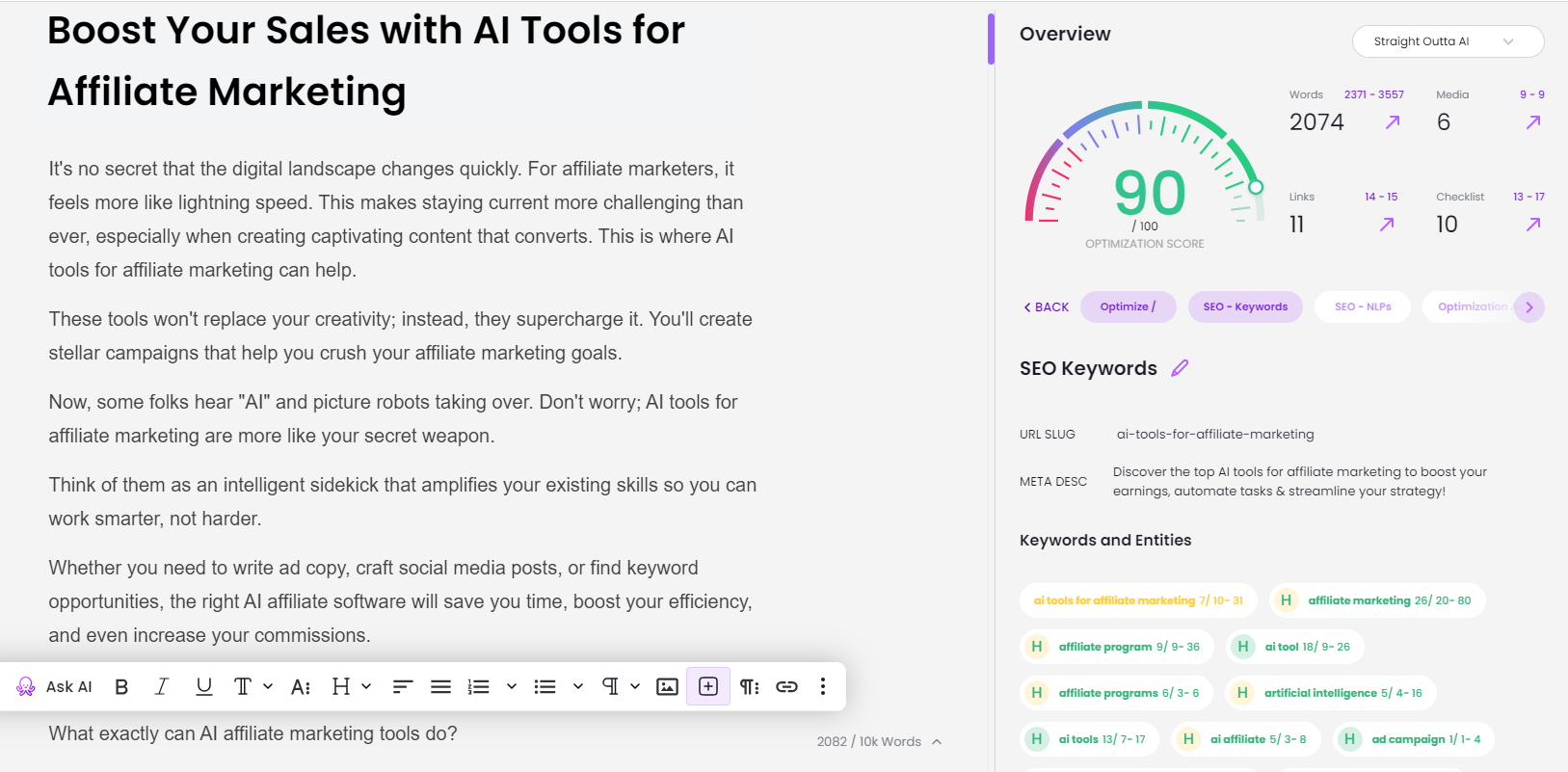
This, by the way, helps build Google’s new AI model. You’ll be a part of that as it emerges. And as part of the content that builds their AI, you will get attributed — which is a good thing.
4. Use AI in your content creation process.
You can cut a lot of time and cost by using a powerful AI writer like BrandWell but make sure that you’re putting in your personal experience or story before the final draft goes out.
5. Lastly, BE the absolute BEST on your topic.
Know your stuff in and out. Spend time researching and learning. Don’t be in a thousand niches: be in YOURS.
Google will see that and credit you in some way. Don’t worry too much about how they’ll attribute it.
DO NOT STOP building E-E-A-T content. Now is the time to double down on it, when others are pausing in fear.
Start Building Your Domain Authority Ahead of SGE
Google confirmed that SGE will serve as a jump-off point so we can actually learn from the people we follow. With over $220 billion in annual revenue from ads and publishers (those that create the content we read and enjoy), Google has a lot to lose if they do not send clicks to those publishers.
If Google were to create a zero-click, full ChatGPT-like experience, they could cannibalize their own income. I don’t see that coming.
Time will tell, but with Google having the monopoly of some of the brightest minds in engineering, data science, and deep learning, and being one of the biggest companies in the world, including owning YouTube (which is doing VERY well these days, incidentally) — it will pivot and adapt.
I think we will see creative pay-to-play opportunities where the creator and publisher will be rewarded significantly. It’s never been a better time to grow your own website and domain authority.
Search isn’t going away. It’s getting better. And I’m here for it.
Time to double down now on our websites, scale our content, and own our niches!
[cm name=”say_goodbye_to_expensive_content”]

